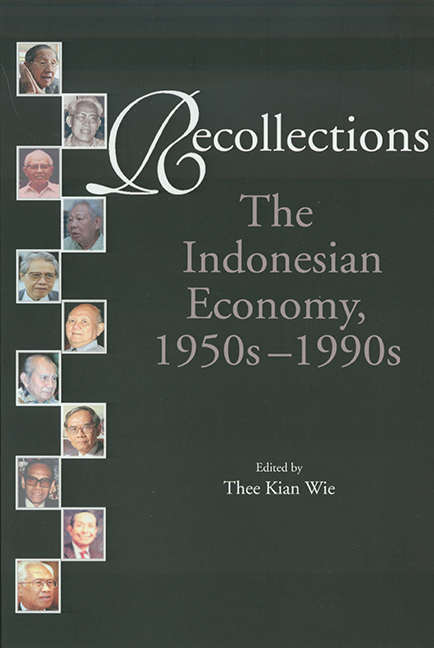Book contents
- Frontmatter
- Dedication
- Contents
- Foreword
- Preface
- Acknowledgments
- Introduction
- II Recollections
- 1 Sumitro Djojohadikusumo
- 2 Mohammad Saubari
- 3 Sjafruddin Prawiranegara
- 4 Abdoel Raoef Soehoed
- 5 Sarbini Sumawinata
- 6 Mohammad Sadli
- 7 Soedarpo Sastrosatomo
- 8 Suhadi Mangkusuwondo
- 9 Emil Salim
- 10 Subroto
- 11 Teuku Mohamad Daud
- Index
- About the Editor
7 - Soedarpo Sastrosatomo
from II - Recollections
Published online by Cambridge University Press: 21 October 2015
- Frontmatter
- Dedication
- Contents
- Foreword
- Preface
- Acknowledgments
- Introduction
- II Recollections
- 1 Sumitro Djojohadikusumo
- 2 Mohammad Saubari
- 3 Sjafruddin Prawiranegara
- 4 Abdoel Raoef Soehoed
- 5 Sarbini Sumawinata
- 6 Mohammad Sadli
- 7 Soedarpo Sastrosatomo
- 8 Suhadi Mangkusuwondo
- 9 Emil Salim
- 10 Subroto
- 11 Teuku Mohamad Daud
- Index
- About the Editor
Summary
FAMILY BACKGROUND AND EDUCATION
Looking at my family background, some of which I discovered only recently, I can better understand my own unconventional behaviour. If I had been a true son of a village family and had gone on to become a civil servant, I doubt that I would ever have done the things that I have done. Some other gene must have been there, something else must have been passed down.
I came from a family of nine children, of whom two eventually went into private business, myself (number seven) and the youngest, Soegianto. My father would have been classified as a government official, but his career reveals some elements which may help to explain why two of his sons were later able to succeed in business. Growing up in a village close to Klaten (between Solo and Yogyakarta) at the end of the 19th century, he was one of the few who went to what is now called a teachers college (sekolah guru; Dutch kweekschool), which in those days was something special. His mentor was one of the founders not only of the nationalist study group Budi Utomo but also of the pioneer Indonesian life insurance company Bumiputera 1912. At the time my father graduated, the Dutch government was involved in the ‘pacification’ of the archipelago and needed many government officials to extend the administration. The only source was the sekolah guru — which for Indonesians were the only decent ones in existence. This teacher told my father to apply, because he was too restless for teaching and, besides, he would make more money. He was accepted, put in the service of the Opium Regie (the state opium monopoly) and posted to Buleleng in North Bali (the back door for smuggling opium into Java). Later he was transferred from Buleleng to Pangkalan Brandan in North Sumatra, where in the panglong (coastal timber-cutting settlements) there were many Chinese, all of whom smoked opium.
- Type
- Chapter
- Information
- RecollectionsThe Indonesian Economy, 1950s–1990s, pp. 141 - 164Publisher: ISEAS–Yusof Ishak InstitutePrint publication year: 2003

